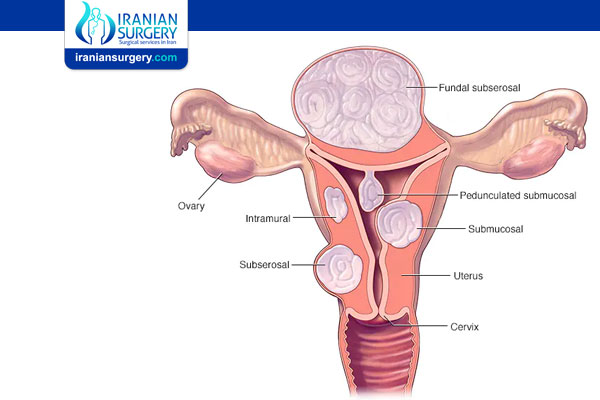Fibroid Cancer Symptoms
Fibroid Cancer Symptoms
In the United States, an estimated 26 million women between the ages of 15 and 50 have uterine fibroids. Uterine fibroids are a type of benign tumor that commonly develops in or on the uterus. Although not usually considered life-threatening, fibroids have the potential to put pressure on surrounding organs, impact fertility, as well as cause painful and uncomfortable symptoms.
While fibroids are almost always benign (non-cancerous), many people still wonder about the relationship between fibroids and cancer. Below, you will find helpful information about uterine tumors, fibroid cancer, and treatment. If you have additional concerns, you should contact a fibroid specialist.
Though fibroid cancer does occur, it is extremely rare. Fewer than 1 in 1,000 fibroids are cancerous. The true problem cancerous fibroids present is the challenge of differentiating them from benign tumors.
Are Fibroids Cancerous?
Fibroids are almost always benign (not cancerous). One in 1,000 fibroids are found to be cancerous. However, if a fibroid is determined to be cancerous, it is called leiomyosarcoma.
Doctors think that such cancers do not arise from an already-existing fibroid because it does not increase the risk of developing a cancerous fibroid. Having fibroids also does not increase a woman’s chances of getting other forms of uterine cancer. Therefore, it is highly unlikely that your fibroid(s) contains cancerous cells.
Experienced fibroid specialists can assess ultrasounds and MRIs very closely to determine whether or not a fibroid may be cancerous. If more tests are needed to verify, your doctor will make personalized recommendations for next steps.
Fibroids vs Cancer Symptoms
Since benign fibroids and cancerous tumors both grow in the uterus, it may be difficult to tell them apart. One issue is that these two types of growths often cause similar signs. If you are experiencing symptoms, it’s essential to seek advice from a doctor or specialist.
Common fibroid symptoms include:
. Heavy, prolonged menstruation between or during your periods
. Anemia, which can lead to fatigue and iron deficiency
. Pain during intercourse
. Frequent urination or difficulty emptying the bladder
. Constipation and/or bloating
. Pain in your pelvis or lower back
. Increased menstrual cramping
. Stomach swelling
In addition to symptoms associated with benign uterine fibroids, signs that a fibroid may be cancerous include:
. Quick fibroid growth that can cause stomach pain
. Post-menopausal bleeding
. Anemia from heavy bleeding that can result in fatigue
. Unusual findings from imaging or blood tests
Some factors, such as age, genetics, and lifestyle, may increase your likelihood of developing fibroid cancer. If you are unsure whether you’re experiencing symptoms of fibroids or something more serious, make sure to contact a fibroid specialist.
Can Cancer Be Mistaken for Fibroids?
An important issue that cancerous fibroids present is the challenge of differentiating them from benign tumors. Both fibroids and cancerous tumors can look similar, while having similar symptoms. Consulting a fibroid specialist can help you avoid delayed or inaccurate diagnosis.
Prompt action is also recommended, since early intervention generally leads to the best possible health outcomes.
How Do Doctors Know It’s a Fibroid Instead of Cancer?
Medical imaging, including ultrasound and MRI, can be used to tell the difference between fibroids and cancerous tumors in the uterus. Additionally, pathologists (doctors who specialize in analyzing bodily tissue) can look at a biopsy of the fibroid under a microscope and count the dividing cells. By counting these dividing cells, also known as mitotic figures, they can determine if a fibroid is cancerous.
If cancer is suspected based on your imaging exams, further examination or treatment may be recommended.
Can Fibroids Cause or Turn into Cancer?
Doctors believe that leiomyosarcomas arise independently of existing fibroids, which means that having fibroids does not increase your risk of developing fibroid cancer. While fibroid cancer can occur, it is extremely rare. Again, fewer than one in 1,000 fibroids are cancerous.
Fibroids vs Cancer Treatment
Though the risk of developing fibroid cancer is very low, it’s still important to keep in mind when you’re considering how to manage your uterine growths. Some treatments designed to treat benign fibroids can make a prognosis worse if they’re unknowingly used on cancerous tumors.
In past years, tools known as power morcellators were used in hysterectomies and myomectomies to break up fibroids and make them easier to remove. In recent years, procedures with power morcellators have been associated with spreading cancer cells. Today, the U.S. Food and Drug Administration warns against their use due to the risk of spreading undiagnosed cancer cells to other parts of the body.
There is a safe, effective, minimally invasive treatment called Uterine Fibroid Embolization (UFE). This non-surgical, outpatient solution doesn’t use power morcellators and leaves the tumors in one piece. UFE blocks off the blood supply to the fibroids and causes them to shrink and wither away over time.
If your fibroid is believed to involve cancerous cells, you will likely be referred to an oncology team who specializes in uterine cancers. They can discuss your treatment options and make personalized recommendations, which may include surgery, chemotherapy, and/or radiation.
About Iranian Surgery
Iranian surgery is an online medical tourism platform where you can find the best gynecologists and fertility specialists in Iran. The price of Fibroid Cancer Treatment in Iran can vary according to each individual’s case and will be determined by an in-person assessment with the doctor.
For more information about the cost of Fibroid Cancer Treatment in Iran and to schedule an appointment in advance, you can contact Iranian Surgery consultants via WhatsApp number 0098 901 929 0946. This service is completely free.
Source:
https://www.usafibroidcenters.com/uterine-fibroids/fibroid-cancer/


